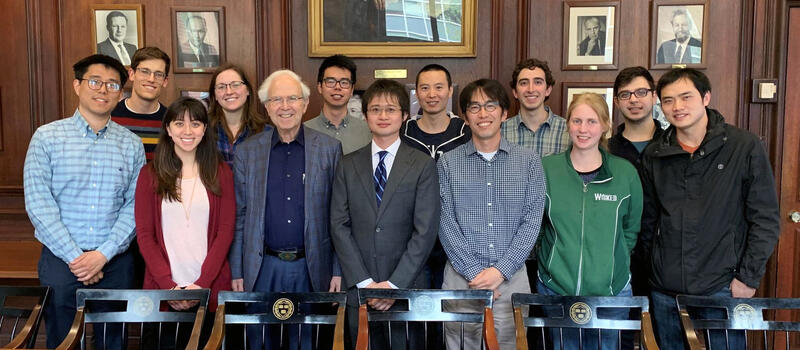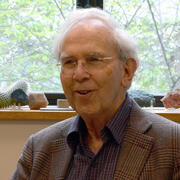Harvard honors Professor Roy Gordon's legacy with a new endowed title
Roy Gordon can no longer leave Harvard University. Though he will choose to retire and depart at some point in the future, when he does, his name will remain: On July 2, 2020, the Faculty of Arts and Science’s Dean of Science Chris Stubbs announced the establishment of a new endowed professorship, gifted in honor of Gordon: The Roy Gerald Gordon Professorship in Chemistry.“Roy Gordon has spent virtually his entire adult life at Harvard,” Stubbs said in his announcement, “first arriving here as a student at Harvard College in the late 1950s. Six decades later, he remains a pioneer at the leading edge of solving the world’s most pressing problems, including climate change.”
Gordon, the Thomas Dudley Cabot Professor of Chemistry and Professor of Materials Science, was precocious even as a child: He still boasts a scar from when his childhood chemistry lab exploded.
Today, he holds over 100 patents for inventions in thin films, energy conservation, and semiconductor electronics, to name a few. In the 1970s, for example, he designed a window coating that acted as a better insulator, enabling homes to retain heat in winter and cool air in summer. So-called hard-coat low-E glass is still widely used today to conserve energy worldwide. This invention—which can be seen in the collections at the Corning Museum of Glass—was a launch point for another valuable innovation: thin-film solar cells. Thin enough to deposit on glass, such cells could transform ordinary windows into solar panels for cheaper energy production.
What if clouds block out the sun? Gordon has a solution for that, too. He and Michael Aziz invented a new type of battery that can store solar and wind energy for cloudy and windless days. Their “flow battery” could enable safer, more convenient energy storage from renewable sources and incentivize the energy industry to more easily prioritize solar and wind.
Last year, their flow battery earned Gordon and Aziz the Eni Award for Innovation in Energy, also known as the “Nobel Prize for Energy,” according to the organization’s press release. “The world needs to end its addiction to oil and gas,” Gordon said during his acceptance speech, “because these fossil fuels are polluting our atmosphere with carbon dioxide, overheating the earth and turning the oceans to acid.”
Though some batteries can store high amounts of electricity already, they’re often made with toxic materials like nickel, cadmium and lead, or rare (and therefore expensive) ones like lithium and vanadium. Lithium batteries may be valuable but they can also catch fire. “Our flow batteries are inherently safe, not poisonous or inflammable,” Gordon said. Since they use naturally abundant elements like carbon, hydrogen, and oxygen, they’re potentially cheaper, too.
Most recently, Gordon and Aziz invented a way to prolong the life of their battery: Their “zombie quinone,” a molecule that literally rises from the dead, could keep batteries running longer at a lower overall cost.
In addition to his energy-conserving windows and solar cells that convert sunlight directly to electricity, Gordon invented several improvements to electronics, including computers that can handle higher memory levels and processing speeds.
“Roy’s most significant accomplishments,” said Stubbs, “are not derived from the accolades he has received but rather from the contributions he has made to Harvard and the world. His lab—which boasts more than 150 accomplished alumni—has revolutionized the manufacture of semiconductor components, made better computers available around the world, and contributed to the growth of the information economy.”

|
Gordon group members, before the end of the 2020 academic year. Photo courtesty of the Gordon group |
For now, Harvard will award a new title—the Oxford Street Professorship in Chemistry—to an eminent scholar in chemistry. “Upon Roy’s retirement—which I sincerely hope is in the distant future,” Stubbs said, “it will be renamed the Roy Gerald Gordon Professorship in Chemistry.”
“This professorship,” said Ted Betley, the chair of the department of chemistry and chemical biology, “commemorates Roy’s tremendous career here at Harvard. Thank you, Roy, for your generosity and for being a treasured colleague.”
This endowed professorship is made possible thanks to an extraordinary commitment made by Roy’s family, friends, and colleagues. In that spirit, Dean Stubbs invites anyone who wishes to contribute a gift to this endowment fund in recognition of Roy’s contributions to please visit this dedicated giving page or contact Georgia Shutzer, managing director in the Faculty of Arts and Sciences Development Office.
